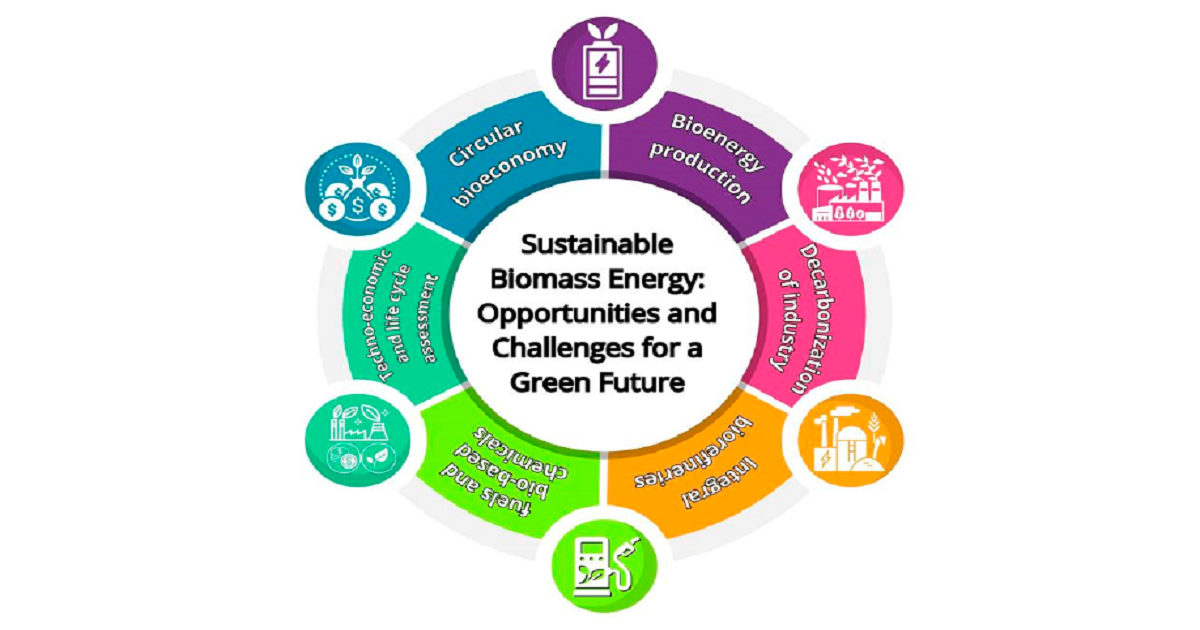Sustainable Biomass Energy: Opportunities and Challenges for a Green Future
A special issue of Sustainability (ISSN 2071-1050). This special issue belongs to the section "Energy Sustainability".
Deadline for manuscript submissions: 10 December 2024 | Viewed by 613

Special Issue Editors
Interests: bioenergy; biofuels; bio-based chemicals and materials; techno-economic analysis; life cycle analysis
Special Issues, Collections and Topics in MDPI journals
Special Issue Information
Dear Colleagues,
The industry plays a key role in the development of new sustainable energy generation strategies to reduce the emission of greenhouse gases and mitigate the increase in the Earth’s temperature, which causes climate change, such as energy generated from biomass or bioenergy. Biomass, when subjected to sustainable physicochemical or biotechnological conversions, generates cleaner energy, fuels and bio-based chemicals than traditional fossil fuel technology. This type of technology offers satisfying advantages such as the abundant presence of biomass on Earth and is now a major challenge that has been set in motion to achieve a green future worldwide. Nowadays, the implementation of bioenergy implies a considerable challenge, as the objective is to improve several aspects such as achieving processes that are economically profitable compared to the fossil industry, with benefits for the development of communities and decarbonization of industry sectors such as petroleum, chemical, power and heat generation, transport, agro-industrial, agricultural and cement, among others.
This integration could be achieved by investigating those challenges that allow us to move the energy industry to a decarbonized and green industry, analyzing those opportunities where we need to work on the gradual introduction of green technologies. This Special Issue welcomes original research articles and critical reviews on the developments and challenges involved in the energy industry's transformation to a net zero emissions sector through the support of the biomass-based industry.
In this Special Issue, original research articles and reviews are welcome. Research areas may include (but are not limited to) the following:
- Increasing sustainable bioenergy production.
- Developing a sustainable circular bioeconomy.
- Decarbonization of industry using renewable energy such as bioenergy.
- Biofuels production and its sustainable impact.
- Integral biorefineries for energy, fuels and bio-based chemicals.
- Techno-economic and life cycle assessment in bioenergy.
- Strategies to develop a green industry.
We look forward to receiving your contributions.
Dr. Jorge Aburto
Dr. Arick Castillo-Landero
Guest Editors
Manuscript Submission Information
Manuscripts should be submitted online at www.mdpi.com by registering and logging in to this website. Once you are registered, click here to go to the submission form. Manuscripts can be submitted until the deadline. All submissions that pass pre-check are peer-reviewed. Accepted papers will be published continuously in the journal (as soon as accepted) and will be listed together on the special issue website. Research articles, review articles as well as short communications are invited. For planned papers, a title and short abstract (about 100 words) can be sent to the Editorial Office for announcement on this website.
Submitted manuscripts should not have been published previously, nor be under consideration for publication elsewhere (except conference proceedings papers). All manuscripts are thoroughly refereed through a single-blind peer-review process. A guide for authors and other relevant information for submission of manuscripts is available on the Instructions for Authors page. Sustainability is an international peer-reviewed open access semimonthly journal published by MDPI.
Please visit the Instructions for Authors page before submitting a manuscript. The Article Processing Charge (APC) for publication in this open access journal is 2400 CHF (Swiss Francs). Submitted papers should be well formatted and use good English. Authors may use MDPI's English editing service prior to publication or during author revisions.
Keywords
- biomass
- bioenergy
- sustainability
- decarbonization
- circular and bioenergy economy
- biofuels
- life cycle assessment
- social impact
- techno-economic assessment
- green industry
Planned Papers
The below list represents only planned manuscripts. Some of these manuscripts have not been received by the Editorial Office yet. Papers submitted to MDPI journals are subject to peer-review.
Title: Revaluation of agave bagasse for the production of fuel pellets
Authors: Eliud Escudero Enríquez, Sergio Iván Martínez Guido, Oscar Daniel Lara Montaño, Claudia Gutiérrez Antonio
Affiliation: Facultad de Ingeniería, Universidad Autónoma de Querétaro, Av. Cerro de las Campanas d/n, Col. Las Campanas, 76010, Querétaro, Querétaro, México.
Abstract: Agave bagasse is one of the main residues in the tequila production. This residue is usually left alone in open fields, causing soil pollution problems. Several alternatives for its revaluation has been proposed in the literature; however, they are not applied because of its low efficiency or elevated processing times. Therefore, in this work the use of agave bagasse for the production of fuel pellets is presented. The manipulated variables are the humidity content and the particle size, while the response variables are ash content, humidity content as well as calorific power. Results indicated that is possible to obtain a fuel pellet from agave bagasse. Main observed complications were ash content, which is associated with the traditional vessels used for the production of tequila. Attempts varying moisture could lead to better particle size distribution in the fuel pellets. Finally, the calorific power satisfy the value indicated in the ISO 17225 standard. These results allow the use of this solid biofuel in the same tequila production process, aligning it to the circular economy approach.





